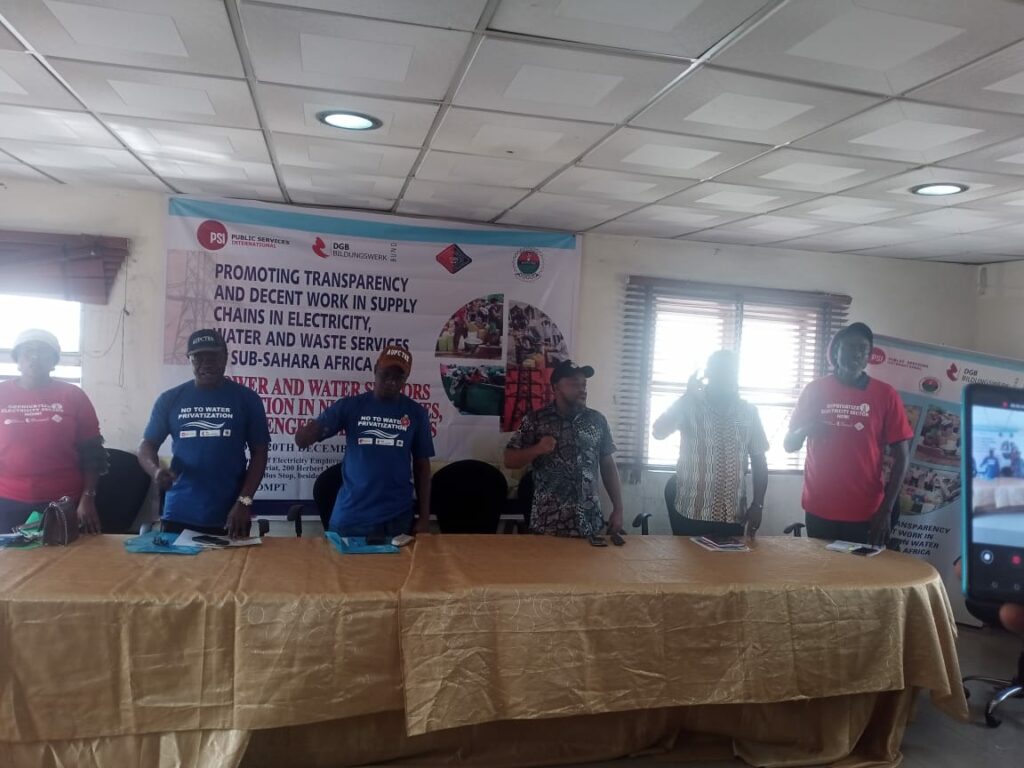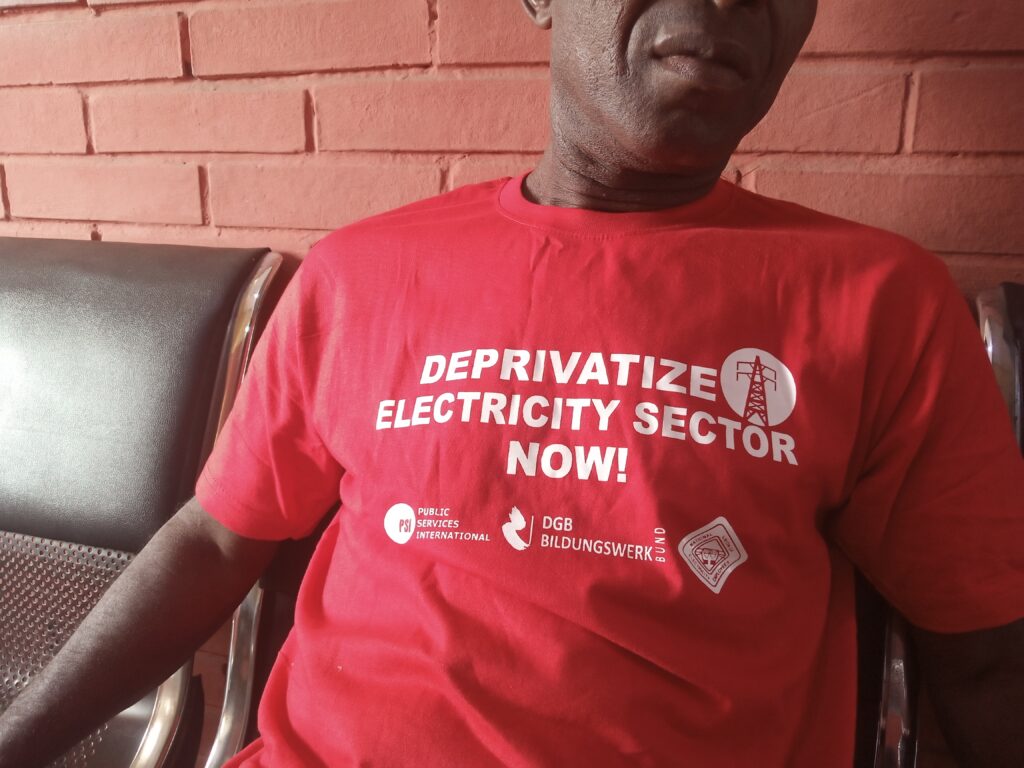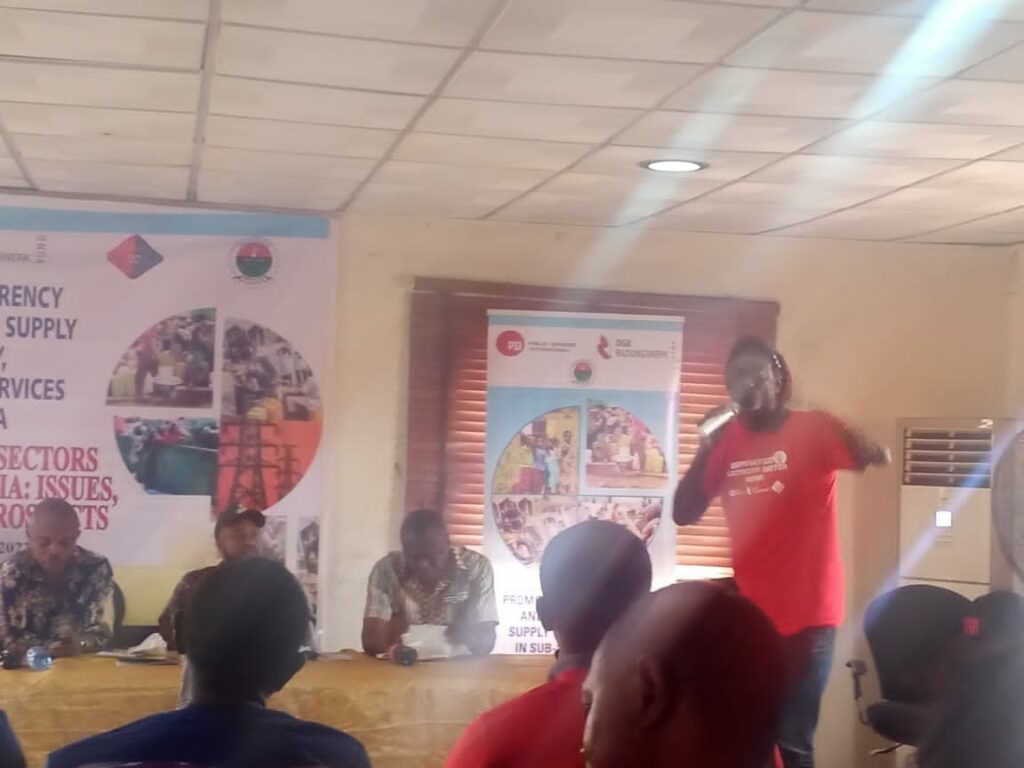WATER AND POWER PRIVATISATION.

A Public Symposium Held in Lagos.
Labour Must Mobilise the Nigerian People To Resist Government Policies.
Seyi Lasisi and Tunde Yusuf
November 2013, the Jonathan’s regime privatized the electricity sector, this is after several years of government underfunding and several bailouts to the Discos and Gencos. The Nine years of privatisation, the power industry has become worse than it was before it was handed over to private individuals. Since then, the Nigerian masses keep paying for darkness and the so-called private investors keep smiling at the banks.
Since returning to a democratic regime in 1999, the capitalist governments have continued to campaign for sales of public infrastructures. Unfortunately, politicians have continued to auction the public sector for sale and at the same time they are the people buying it and selling it to their cronies in government.
The next agenda for the ruling elites is their campaign to privatize the water resources in the country. In recent times, the private water industries are turning their sight to the African market and the capitalist government are preparing the grounds to take over water resources that is seen as an easy task. In Nigeria, we have observed continuous reintroduction of the Water Resource Bill to the national assembly the law makers are preparing to privatized it.
The SOLIDARITY, paper of the Movement for A Socialist Alternative featured the story in its July/Aug edition, 2022. In the edition, it was reported: “the bill if passed is said to bring all water sources and river banks under the control of the federal government and cede land and waterways across the country about 2km inland to the FG. Ordinarily, this should be welcomed by socialists, but the reality is that the bill is far from such intention of putting the water needs of the people first and foremost, rather the bill seeks to commercialise the country’s water resources as a first step towards it full-scale privatization”.
A REPORT OF THE
SYMPOSIUM
The struggle against water and power privatization by the Amalgamated Union of Public Corporations, Civil Service Technical and Recreational Employees (AUPCTRE) and the National Union of Electricity Employees (NUEE) in collaboration with Public Services International (PSI) saw a public symposium held on 20, December 2022 with the theme: “Water and power sector situation in Nigeria; Issues, Challenges and Prospects.”

Six comrades of MSA-Lagos attended the symposium with papers and leaflets. Labour leaders in attendance were the NUEE president, General Secretary of NUEE, President of AUPCTRE and NLC Women Coordinator. The program began with solidarity songs. President of NUEE Matin Uzoegwu in his welcome address provided the essence of the program as it was to discuss challenges of power, water and waste management.
According to him for the past nine years, the power sector has not improved despite the sector privatisation. The NUEE president reiterated the call for the reversal of the policy of privatization. He spoke the deprivatisation of the power sector as the only option for the efficient running of the industry. National President of AUPCTRE Benjamin Anthony condemned the privatization of water resources and promised the union will not relent in the struggle against it.
In highlights, he mentioned that the union has spent fifteen years fighting against privatization as the sector continued to be underfunded. He mentioned most countries that have privatized the sector i.e. water are reversing the policy like Uganda which has retrieved its privatization policy. He mentioned that Nepotism, lack of understanding and technical expertise to handle the power and water sector are challenges that makes the policy anti-people policy.
In he’s words, he said. “We want power and water resources back in the hands of the people. It is only in Nigeria that the government will sink boreholes and will be selling it to its people”. He urge the masses and people in attendance not to support the Water Resource Bill as he described it as devilish. Added to what the AUPCTRE president said. One per cent of Nigeria’s population has appropriated the common resources of the people to themselves in the guise of privatisation.

Abiodun Bakare, the National Coordinator of the program thanked union leaders and civil society organizations for attending a crucial event that matters to the survival of the people. He urges the gathering to support the struggle against the privatization of the energy sector such as power, water and waste management. “Collaboration and solidarity are key in the campaign against privatization to sensitize the public”, he stated.
Keynote Address by Comrade Joe Ajaero, National Deputy President of Nigeria Labour Congress was highlighted. And, he gave a historical perspective on the struggle against the privatization of the electricity sector and lament the absence of collaboration of other labour unions in the struggle against privatization as a quick process for the government takeover of the sector; off the hands of private investors making profit.
He observed that the internal wrangling within labour unions also had an effect, as the struggle was ideological between finance capital and labour. Privatization of the National Electric Power Authority NEPA according to him was sold at the sum of N400 billion, which is the same amount of workers’ entitlement and gratuity that the Federal Government have refused to pay since the privatization in November 2013. He emphasized that the power sector that worth billions of naira was sold paltry amount.

Ajaero also stated that since the power sector was privatized, the investors have not invested in the sector neither to build any power station nor increase the megawatts. In spite of the private sector’s failure to supply regular electricity to homes, the Federal Government had given a bailouts of N2 trillion to private investors that are supplying darkness and billing electricity consumers estimated billing, which is taller than the N30,000 minimum wage many state government are not paying. He described the country’s situation as “the seller is also the buyer.”
In he’s added view, the NLC National Dep. continued. Those who are supposed to manage our common resources connived with the politicians and top bank managers to buy the Distribution Companies (DisCos) according to him are currently on the hot seat as the banks are taking over most Discos as they cannot meet up their financial responsibilities. He summarized that NUEE was isolated by other unions during the struggle. However, they will support AUPCTRE in collaboration with civil societies to fight against privatization of the water sector.
Also speaking at the event is comrade Dagga Tolar, the General Secretary of the Movement for A Socialist Alternative (MSA). Speaking on the crises caused by the failure of capitalist programmes in the country, he stated the Buhari government’s attempt to “unbundled the NNPC” through the Petroleum Industrial Act, which today has put the entire country in a mess of petroleum artificial scarcity despite the increase in the prices. Other speakers invited to the symposium also share light on the theme discussed.
Relating capitalism as the mother of corruption, he recalled the gathering to the recent news where NNPC for several months has remitted zero naira to the federation account. He continued by stating that the ruling elites are committed to continuous privatization of our common wealth and that the labour leaders need to unify the rank and file of all workers in the country. It is for the working class to organise a political alternative of the oppressed against the system of profit. Only through this channel will capitalism be defeated.
This is what the MSA in all its publication has continue to emphasize. Importantly, using it to call on the labour leaders organise to workers to change the course of history as socialism remain the only way out to the rise of poverty, inequality, and unemployment. In the symposium, the comrades engaged workers and persons that attended with the paper. And 28 copies of the SOLIDARITY paper were sold at the event. The National Union of Electricity Employee bought ten for solidarity price.
